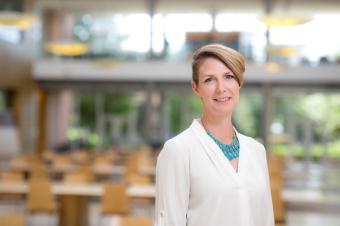Dr. Lisa Osborne
University of British Columbia
Dr. Lisa Osborne, University of British Columbia
Dr. Lisa Osborne has a long-standing interest in host-pathogen interactions and how the regulation of inflammation and immunity intersect. After completing her PhD (Ninan Abraham, UBC 2010), she pursued post-doctoral research with David Artis at the University of Pennsylvania where she received fellowship support from the Cancer Research Institute as an Edmond J Safra scholar. In 2015, she joined the Microbiology & Immunology department at UBC as the Canada Research Chair in Host-Microbiome Interactions. Her team takes advantage of mouse models to interrogate how specific perturbations to the intestinal ecosystem influence host-protective antiviral immunity and pathogenic autoimmune responses, particularly in the context of multiple sclerosis (MS). Her goal is to understand how specific microbes (including multicellular helminthic worms), microbial communities, and the metabolites they produce, interact with the host immune system to identify levers that can optimize host health and immunity.
Learn more about Dr. Osborne
What is the focus of your research? How did you become interested in MS research?
An optimally functional immune system protects against infectious disease, which means it has to be ready to respond to any given threat immediately. Unfortunately, under some circumstances, the immune response can be targeted against our own tissues, resulting in autoimmune diseases like MS. The intestinal microbiota (the collection of bacteria, viruses, and eukaryotes that live in the gut) play a key role in modulating immunity, and research in my lab interrogates how genetics and environmental signals shape immune function. MS is too common in Canada, and our team is working to more fully understand how signals that are initiated in the gut can shape disease onset and progression.
What inspires you to continue advancing research in this field?
People living with MS are the inspiration for our research. This is a lifelong condition without a cure, but there are people in this community who advocate tirelessly for better care for themselves and others. We are committed to working alongside them until there are better ways to prevent or treat MS.
How do you hope to change the lives of people living with MS through your research?
There are many ways to impact lives. Our basic research is aimed at identifying cellular and molecular mechanisms that can be used to either delay disease onset, or to enhance regenerative pathways to limit or even reverse damage. While that research continues, we want to acknowledge the many ways that living with MS can be draining and to let the community know we’re here with them.
What do you enjoy most about your research? What are some of the challenges you face?
I love working with trainees in my lab. They’re so bright, creative, and dedicated and are absolutely the best part of my job. Some of the current challenges we face are the same as those so many Canadians are dealing with right now – cost of living is rising rapidly, and we have limited funds that can be spent on trainee stipends or on research budgets, but not both. We have to be extremely judicious to make sure we do the right experiments, and do them well. It’s a privilege to be working with MS Canada funds.
How important is the support from MS Canada in your research?
The support of MS Canada is incredibly valuable. Canada is home to so many internationally recognized experts in MS research, and their endorsement of our ideas is rewarding. Our goal is to leverage this support for additional funding so we can expand our research into ways we can modify the intestinal microbiome to enhance neuroimmune-mediated pathways that limit MS onset and progression.
